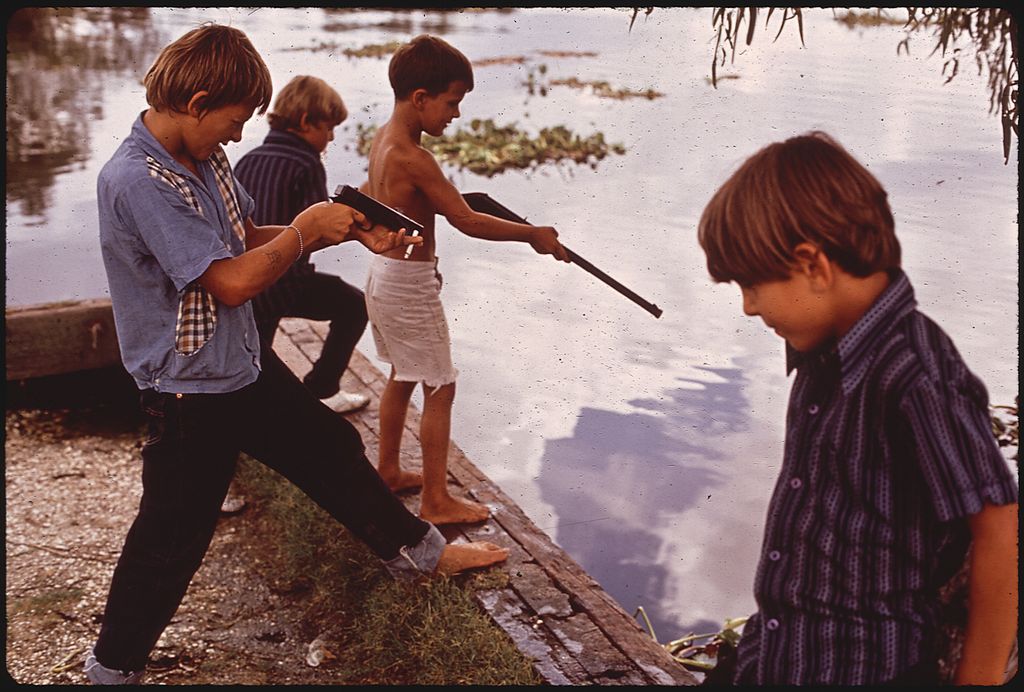To Understand America’s Resistance to Gun Control, Look to Religion
As America grapples with another mass shooting, this time at a concert in Las Vegas, the arguments put forth by both sides have not exactly tread new ground. There have been some encouraging signs of progress, namely the growing consensus around a ban of the bump-fire stocks the shooter used to simulate automatic fire and kill 58 people. Yet much of the debate remains couched in appeals to public safety and evocations of constitutional rights, doing little to address the deep intractability that marks the gun control debate.
The less measured responses to the shooting have been equally predictable. The day after the shooting, evangelist Pat Robertson broadcast a message claiming that the shooting stemmed from a cultural sense of disrespect – disrespect stemming from a lack of Godliness. “Until there is Biblical authority, there has to be some controlling authority in our society, and there is none,” Robertson said. “And when there is no vision of God… the people run amok.”
Responses like Robertson’s are often at the fringe of the pro-gun movement. While many politicians will react with the now-standard line of “thoughts and prayers” for the victims, directly ascribing tragedies to a lack of Godliness risks far more controversy. It is much more common for pro-gun figures to appeal to American’s constitutional right to own firearms, or to lament that gun control would have done little to stop a particular shooter. And as responses to Robertson’s proclamation have shown, society at large is not always receptive to this line of thinking, at least when expressed in such a confrontational manner.
However, arguments similar to Robertson’s comments have appeared before. In the wake of the 2012 Sandy Hook school shooting, former Speaker of the House Newt Gingrich argued that the shooting resulted from “an anti-religious, secular bureaucracy and secular judiciary, seeking to drive God out of public life.” Like Robertson’s comments, Gingrich drew widespread criticism for pushing a religious explanation for the tragedy. Yet this line of reasoning is far more common than the words of a few extreme commentators suggest. And while it is not often expressed in such direct terms, the religious ideals underpinning comments like Robertson’s prove a central pillar to the arguments against gun control in America.
Key to understanding the role of religion in pro-gun thought is the use of a single word: evil. Responses to the Las Vegas mass shooting have been littered with comments on “evil.” National Rifle Association Executive Director Chris Cox issued a statement that “What we saw last week was pure evil, and we’ve seen evil existed in this country. We’ve seen box cutters in airplanes, cars, bombs, trucks full of explosives, and yes firearms.” Countless politicians, including the president himself, have referenced “evil” as the explaining factor of recent mass shootings, instead of other relevant factors such as gun restrictions and mental health. This word “evil” is thrown around without much exploration into what it means. What kind of evil are politicians talking about here?
The commentary that evil exists in the world and cannot be eradicated is not new. The philosophical area of study known as the “Problem of Evil” addresses just that: why would an omnipotent loving God allow evil to persist in the world? This sort of capital “E” Evil can be characterized as otherworldly, unpredictable, and uncontrollable to anyone except God. When politicians speak of mass shootings as “evil,” they are taking away human agency to stop them, and they run the risk of ascribing blame to the abstract idea of evil instead of the shooter themselves. If mass shootings are seen as a manifestation of evil, the focus desperately needed on systemic issues that cause shootings are overlooked.
If “evil” is an amorphous entity that can enter a seemingly normal person, as many mass shooters are described, how can they be assigned blame? Sarah Johns with The New Republic argues that ascribing evil to mass shootings dehumanizes the shooter themselves, further distancing the problem from gun control. The end result of this dehumanization of mass shootings is a kind of gun control fatalism; since there is nothing that can be done to curb evil, gun control legislation would be futile. This takes away blame from the shooter, and agency from citizens to do anything about mass shootings.
However, this fatalistic attitude ignores some of the most basic facts about mass shootings. The most compelling example is that in a study with over 11,000 shootings, 63 percent could be predicted through social media. Rex Huppke with the Chicago Tribune implores Americans to look past prayers to see common sense: “[there’s] no reason to fall back on prayers and simply hope for an explanation from God. There are steps we can take, on guns and on mental health.” Johns and Huppke argue that gun control fatalism is a psychological trap that tricks individuals into thinking thoughts and prayers are the only remedy to a problem rooted outside human agency.
This fatalistic view of evil also holds significant sway over the solutions to gun violence that many pro-gun campaigners put forth. Foremost among them is the notorious argument that only a “good guy with a gun” stops the proverbial “bad guy with a gun.” Popularized by Wayne LaPierre’s speech in the wake of the Sandy Hook shooting, the “good guy with a gun” argument has since proliferated in pro-gun circles. The connections to an otherworldly evil are clear here; if only God can address evil systematically, the best thing people can do is arm themselves in hope of meeting evil on equal ground. Such arguments markedly ignore the systematic causes of gun violence and reflect the assumption that evil cannot be mediated, only fought one-on-one in instances where it inevitably appears.
So too can this view explain one key discrepancy seen in the wake of the Vegas shooting – the fact that, if the shooter were Muslim, his ideology likely would have been immediately and heavily scrutinized as his key motivator. The role of Islam in violence plays directly into the implicitly religious narratives surrounding the gun control debate, making it an easy target for pro-gun commentators to put forth. If the root of gun violence is fundamentally religious, blaming a non-Christian shooter’s religion for his or her actions is a logical extension of the argument.
Ultimately, viewing pro-gun arguments in a religious light may only complicate solutions going forward. When considered in isolation, people may be willing to change their minds about specific policies or actions. However, if these policies are interpreted through a deeply personal religious worldview, these beliefs will likely be all the more intractable.
However, viewing issues of gun control through a religious lens does offer those seeking gun safety measures a way forward. Thus far, gun safety campaigners have not made religious appeals a significant element in their arguments, despite its central role in anti-gun control thought. By embracing this religious framework and using it to communicate arguments for gun safety, gun control campaigners may find their opponents more receptive to their arguments. In a debate marked by polarization and fatalism, such an approach may be the best first step in bridging the divide.





